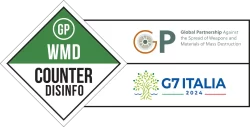What is Bioweapons Disinformation?
Bioweapons disinformation has a long and troubling history, dating back to the Cold War. Today, disinformation campaigns are more pervasive than ever, spreading faster and reaching wider audiences through new platforms.
One recent example targeted U.S.-supported public health labs in Ukraine. Russia falsely claimed that these labs were involved in activities that breached the Biological Weapons Convention (BWC). These fabricated allegations were actively pushed by Russia at the UN Security Council, the General Assembly, and to BWC delegations, as well as across social media. Despite the high-profile nature of the campaign, neither UN independent experts nor investigative journalists found any evidence to support Russia’s claims. Instead, the labs were confirmed to be engaged solely in peaceful activities.
This disinformation campaign was a blatant attempt by Moscow to distract from its unprovoked military invasion and ongoing war against Ukraine. As Russia’s claims failed to gain traction at the Security Council and with BWC delegations, the country found itself increasingly isolated. No other state formally joined Russia in accusing the U.S. and Ukraine of non-compliance, and Russia only garnered limited support from a handful of states, who merely endorsed its right to raise questions.
In contrast, more than five times as many states backed the U.S. and Ukraine, rejecting Russia’s baseless allegations. While these claims were proven false, their consequences were nonetheless significant. They created uncertainty, eroded confidence in vital public and animal health infrastructure, undermined global biosafety and biosecurity efforts, and jeopardized international cooperation on peaceful biological research.
Russia’s disinformation campaign against labs in Ukraine underscores the importance of states speaking out against such falsehoods and condemning disinformation aimed at disrupting peaceful cooperation among BWC States Parties.
